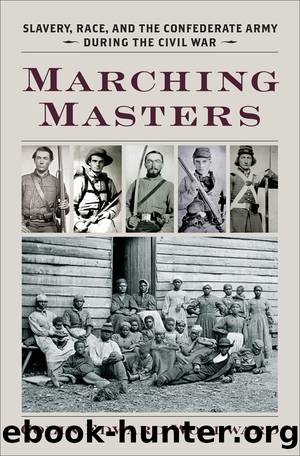Marching Masters by Colin Edward Woodward

Author:Colin Edward Woodward
Language: eng
Format: epub
Publisher: University of Virginia Press
Published: 2014-06-14T16:00:00+00:00
⢠7 â¢
FREE TO FIGHT
THE CONFEDERATE ARMY AND THE USE OF SLAVES AS SOLDIERS
The presence of 200,000 African Americans in the United States army and navy, combined with the vast number of slaves who escaped their masters, underscored black peopleâs desire to help the Union crush the Confederacy. It also showed how the United States was adept at forging an alliance, albeit troubled at times, between black soldiers and their mostly white officers.1 However, as the war turned against the Confederacy in 1863, some white Southerners began thinking it wise to enlist their black population of military age. In 1864 and 1865, the Southern armies engaged in an intense debate about how Confederates could further employ slaves as a tool of the military. The Confederate government finally authorized the use of black troops, but only reluctantly. In March 1865, it passed a weak black enlistment bill, which proved far too late to help the Rebel armies, especially in the West. Nor did the bill fundamentally alter the master-slave relationship in the South, as it did not promise freedom to African Americans who served. Instead, it gave masters the power to decide whether or not their slaves could join the army. Slaves only were free to fight.
The Confederacyâs black enlistment bill was a creature of the white Southâs reluctance to alter the institution of slavery fundamentally. Even supporters of black enlistmentâwho did not see using black troops as incompatible with slaveryâargued from a white-supremacist perspective that viewed Southern blacks as racial inferiors. The debate over enlistment in the South was not a moral one concerning a slaveâs right to be free. Confederates were not arguing from the abolitionist perspective. Instead, they supported or denounced the idea of black Confederate soldiers using the complex, often contradictory, tenets of the proslavery argument. To some proslavery Southerners, enlisting blacks might have seemed radical, but in fact it mostly was a token effort by a slaveholding nation that had run out of options. The Confederacy only debated freeing its slaves when it became obvious that the North would soon free them anyway. Yet, even when they voted to arm African Americans, Confederates still believed they could give slaves guns without having to liberate most of them.
The historian Bruce Levine has argued in his work on the black enlistment debate that the Army of Northern Virginia âplayed a pivotal political role in reorienting popular opinionâ in support of the bill. However, historians have differed over to what extent the Confederacyâs arming of slaves was a revolutionary measure. Some argue that the enlistment debate revealed that white Southerners were prepared to make a radical break concerning slavery. The historian Emory Thomas has written, âThe fact was that the Confederacy was prepared to let slavery perish and to fight on! For what? The new nation and its war had achieved a dynamic of their ownâa dynamic which overshadowed principles and poses.â Other scholars have been more critical of the Confederacyâs support for enlisting blacks. In his work on
Download
This site does not store any files on its server. We only index and link to content provided by other sites. Please contact the content providers to delete copyright contents if any and email us, we'll remove relevant links or contents immediately.
| United States | Abolition |
| Campaigns & Battlefields | Confederacy |
| Naval Operations | Regimental Histories |
| Women |
In Cold Blood by Truman Capote(3368)
The Innovators: How a Group of Hackers, Geniuses, and Geeks Created the Digital Revolution by Walter Isaacson(3120)
Steve Jobs by Walter Isaacson(2883)
All the President's Men by Carl Bernstein & Bob Woodward(2361)
Lonely Planet New York City by Lonely Planet(2206)
And the Band Played On by Randy Shilts(2183)
The Room Where It Happened by John Bolton;(2143)
The Poisoner's Handbook by Deborah Blum(2125)
The Innovators by Walter Isaacson(2095)
The Murder of Marilyn Monroe by Jay Margolis(2088)
Lincoln by David Herbert Donald(1979)
A Colony in a Nation by Chris Hayes(1915)
Being George Washington by Beck Glenn(1879)
Under the Banner of Heaven: A Story of Violent Faith by Jon Krakauer(1787)
Amelia Earhart by Doris L. Rich(1683)
The Unsettlers by Mark Sundeen(1679)
Dirt by Bill Buford(1665)
Birdmen by Lawrence Goldstone(1655)
Zeitoun by Dave Eggers(1636)
